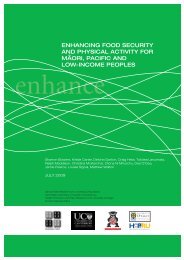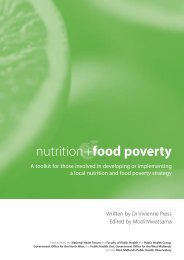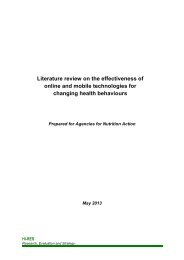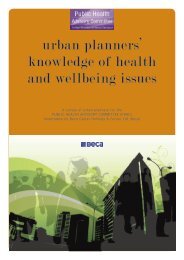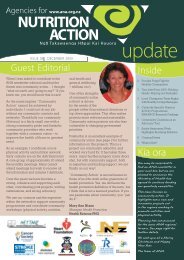CMDHB Lets Beat Diabetes South Asian Plan, Activity and Results
CMDHB Lets Beat Diabetes South Asian Plan, Activity and Results
CMDHB Lets Beat Diabetes South Asian Plan, Activity and Results
Create successful ePaper yourself
Turn your PDF publications into a flip-book with our unique Google optimized e-Paper software.
Why “<strong>Lets</strong> <strong>Beat</strong> <strong>Diabetes</strong>”Our priorities are recognisable~ 9% of <strong>South</strong> <strong>Asian</strong> (Indian) adults have diagnosed diabetes~ 11% of all Pacific adults have diagnosed diabetes~ 7% of Maaori adults have diagnosed diabetes~ 5% of European adults have diagnosed diabetes• higher incidence for families that live in areas of high deprivationNearly half of all <strong>South</strong> <strong>Asian</strong> people will have diabetes by the time theyreach 65 years of age at current rates.LBD Benchmark Study 2007, Phoenix Research. Auckl<strong>and</strong> Heart & Health Study. NZ Health Survey 2002/03 & 2006/072
<strong>South</strong> <strong>Asian</strong> <strong>Activity</strong>{ LBD <strong>South</strong> <strong>Asian</strong> Community Action <strong>Plan</strong> completed in 2008/09financial year{ <strong>South</strong> <strong>Asian</strong> Project Manager contracted from East Health PHOto help facilitate <strong>and</strong> drive this area of action{ 3 <strong>South</strong> <strong>Asian</strong> Community Gardens funded{ <strong>South</strong> <strong>Asian</strong> Lifestyles Coordinator funded two days per weekthrough ProCare, Total Health Otara <strong>and</strong> <strong>Lets</strong> <strong>Beat</strong> <strong>Diabetes</strong>{ Active recruitment of <strong>South</strong> <strong>Asian</strong> Leaders for Self ManagementEducation training{ Physical activity opportunities for the community underdevelopment through CM Active{ Participation by two groups to date in a Nutrition Education{ <strong>South</strong> <strong>Asian</strong> Leaders Programme under development3
Background <strong>and</strong> objectives{ The initial LBD "Swap2Win" 2007 campaign wasevaluated previously October 2007{ A new campaign launched mid-October 2008• Change in direction of the LBD Marketing campaignprogressing from a platform of 'obesity' to a specific focus ondiabetes{ The objective of this monitor was to evaluate theimpact of the first two stages of this new campaign• October to December 2008• April to July 20095
Research methods{ Two CATI (Computer Assisted Telephone Interviewing) surveysundertaken between 9 - 14 December 2008 <strong>and</strong> 29 June to 11July 2009• Ethnic interviewers{ Budget constraints necessitated limited sample sizes, especiallyfor the initial survey monitor{ The achieved samples were 2008 2009Maaori 44 110Pacific 41 80<strong>South</strong> <strong>Asian</strong> 64 100Other <strong>Asian</strong> 34 46Other 83 132TOTAL 255 401Note that people can be in more than one ethnic groupAnalyses based on ethnic groups do need totake small sub-sample sizes into account6
Advertising recall%20097
Ad recall among groupsIn 2009...{ 83% prompted recall among "at risk" group (overweight, obese,have diabetes, or family history of diabetes){ Those with family history of diabetes particularly high (86%){ Prompted recall no significant difference for females (85%)versus males (82%){ No significant difference by age{ Recall was at 89% in high deprivation areas (NZDep 9-10) <strong>and</strong>medium deprivation areas <strong>and</strong> significantly below this at 62% inlow deprivation areas8
Discussion of the ads{ Discussion is likely to increase the impact of the ads{ High level of discussion in both surveys{ Men (32%) were as likely as women (32%) to discuss them at least "afew" times{ 16 to 24 years were more likely to discuss them at least a few times(43% vs 32% overall){ People from high deprivation areas were also more likely to discussthem at least a few times (40% vs 32% overall)%2009"How often have you talked about this advertising with someoneelse either when you were looking at it or sometime later?"9
Relevance of ads2009Those scoring 4 to 5 on 1 to 5 relevance rating"How relevant you think the DIABETES campaign is to you?"10
Changes as a result of the advertising in 2009i.e. attitudes <strong>and</strong> consideration of making changesCHANGES MADE AS A RESULT OFTHE ADVERTISING(LEVEL OF AGREEMENT)I now feel more motivated to…2009Totalsample Maaori Pacific <strong>South</strong> <strong>Asian</strong> Other(343) (97) (69) (90) (112)% % % % %… drink water instead of fizzy drink 73 73 92↑ 95↑ 60↓… reduce the amount I eat 62 69 85↑ 83↑ 47↓… eat more veges 75 77 83 92↑ 64↓… eat more fruit 76 77 88↑ 90↑ 67… eat healthier lunches 76 80 83 90↑ 69… eat a healthy breakfast 79 75 90↑ 93↑ 73… eat less fried foods or takeaways 68 75 81↑ 84↑ 59Note: Actual wording in question11
Acknowledging the context{ The LBD campaign is taking place in the context of other current<strong>and</strong> past campaigns with related messages{ The LBD campaign is that it is the only major campaign with thefocus being on diabetes.{ It seems likely the message recall has drawn somewhat from theoverall messages people have taken from both this <strong>and</strong> therelated campaigns{ However, the key point is that these messages are being linkedto diabetes (as the questions were clearly asking about thediabetes ads) <strong>and</strong> it has taken this campaign to do this12



